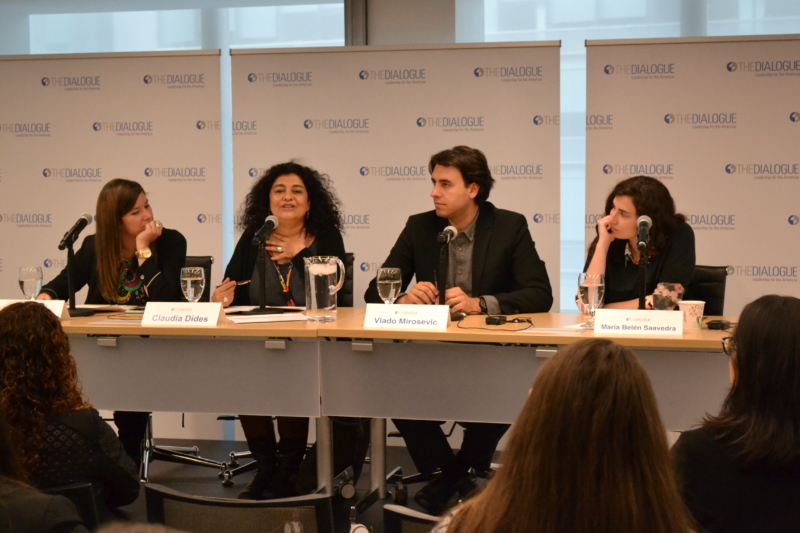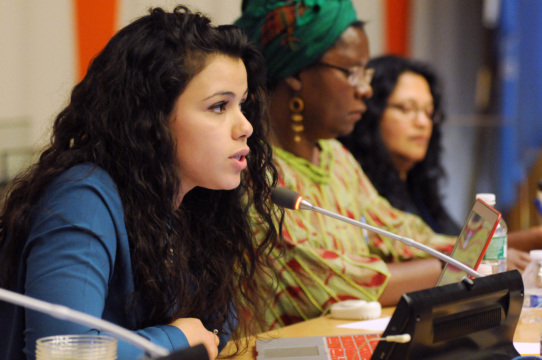What Roles are Women Playing in Mexico’s Drug War?
What roles are women playing in Mexico’s brutal drug trafficking war?
On December 6th, the Inter-American Dialogue hosted a half-day session on “Sexual & Reproductive Rights in Latin America & the Caribbean: Where Are We Now?” in partnership with the Center for Reproductive Rights and the O’Neill Institute for National and Global Health Law. This forum reviewed and compared advances and setbacks on the status of sexual and reproductive rights in several countries. It also served as a follow up to a 2015 report on abortion and reproductive rights in Latin America, and built on collaborations with the Center in 2014 and O’Neill Institute in 2016, when we brought together diverse voices to raise understanding of the issues and forces at play, in the hope that better policies for women throughout the region would result.
The idea behind the event was to explore the implications for democracy, equity, and citizenship raised by policies that restrict access to reproductive health services and move the debate beyond a woman’s right to choose to include considerations of social justice, public health, and the separation of church and state. Discussions began with a brief overview of the status of sexual and reproductive rights in the region by Mónica Roa, a human rights lawyer and activist from Colombia. Roa expressed some concern over the rise of “gender ideology politics”. This term, which was invented by conservative politicians and activists, redefines reforms that benefit women and LGBTI people—such as access to abortion or same-sex marriage—as threats to the traditional concept of family and to Christian values. This trend has spread over the past five years through parts of Europe (especially in Spain, France and Poland) and has seen significant growth in Latin America, specifically in Colombia (around the peace process), Mexico, Paraguay, and Brazil. She also discussed the difficulties involved in implementing new laws, a challenge other panelists would discuss throughout the other sessions. Despite these reservations, Roa’s outlook was largely optimistic. She identified several positive trends in the region including a shift in the debate on abortion from “all-or-nothing” towards laws in favor of therapeutic abortion.
The first panel of the event focused on advances made in Chile. The panelists included Claudia Dides (executive director of Miles Chile), Vlado Mirosevic (member of Congress of Chile), and María Belén Saavedra (lawyer, legal reforms department, Chilean Ministry of Women and Gender Equity). The session was moderated by Catalina Martínez from the Center for Reproductive Rights. In August 2017, after a three-year legal battle, the Chilean Congress approved a bill to decriminalize abortion under three circumstances: when a woman’s life is at risk; in the case of rape or incest; or when the fetus is not viable. Prior to passing this law, Chile was one of six countries in the world that banned abortion under all circumstances. All three panelists agreed that public support from the executive branch, both support from President Bachelet and the Ministry of Women and Gender Equity, provided major ballast to their efforts. They also discussed the importance of maintaining public support for the bill by focusing on normalizing the issue of abortion and moderating the discourse to avoid polarizing public opinion. Chile will have presidential elections soon and a president who is anti-abortion could be elected; however, high public support for the bill could help prevent the recent law from being overturned. While panelists remain optimistic, they all agreed that more work was necessary to promote implementation of the law, specifically in rural areas of the country, including educating medical professionals about the recent legal changes.
The second panel identified challenges in El Salvador and lessons learned in recent years. The panelists included Johnny Wright Sol (member of Congress of El Salvador), Morena Herrera (activist and member of Agrupación Ciudadana por la Despenalización del Aborto), and Angelica Rivas (lawyer and founding member of Agrupación Ciudadana por la Despenalización del Aborto). In El Salvador, women can face up to 50 years in prison if found guilty of abortion, a sentence that has also applied to women who have suffered from miscarriages or other obstetric emergencies. For the first time in 20 years, there are signs that El Salvador’s total ban on abortion could be weakened. The left-wing party Farabundo Martí National Liberation Front (FMLN) has introduced to Congress bills that would allow abortion when women are victims of human trafficking or rape, at risk of dying or becoming ill, and when the fetus is unviable. All three panelists acknowledged challenges they are facing, including the short time frame before mid-term elections in March of 2018 and the rise of gender ideology within conservative political parties. Another challenge for activists is the lack of accurate information regarding maternal mortality rates in El Salvador and the lack of transparency from the Ministry of Health. At the same time, panelists expressed optimism about opportunities for change in the near future, particularly after the recent success in Chile.
The final panel discussion focused on where the region is going with respect to sexual and reproductive rights. The session was moderated by Oscar Cabrera, executive director of the O’Neill Institute for National and Global Health Law. Panelists included Mónica Roa and Eva Villarreal, a legal gender specialist at the OAS Inter-American Commission on Women. This session reiterated several of the themes discussed in Roa’s earlier presentation and in the panels on Chile and El Salvador. Panelists agreed that enhanced coordination was needed among various social movements and international bodies in order to promote progressive sexual and reproductive rights in the region. This cooperation is necessary to introduce and pass laws, but also to create greater public consciousness about reproductive rights as human rights. Roa reminded participants that reproductive rights include access to sex education, contraception, and prenatal healthcare, and protection from forced abortion, in addition to other issues. Villarreal specifically mentioned the Inter-American Commission on Human Rights (IAHCR) as a tool for positive change. While the IACHR cannot force countries to adopt certain policies, it can prevent countries from returning to regressive policies related to sexual and reproductive rights.
The event concluded with remarks from Alicia Yamin, a visiting professor of law at Georgetown University Law Center and program director of the Health and Human Rights Initiative at the O’Neill Institute for National and Global Health Law. Yamin focused primarily on the rise of gender ideology in the region, although she noted that this is a trend in other regions as well, and discussed the importance of the Sustainable Development Goals (SDGs). She specifically underlined the ways ultra-conservative governments are removing education on gender and sexual and reproductive rights from school curricula. Yamin noted that this will have a negative impact in the long term, as these young students grow up with a warped knowledge of and opinion on human rights, including sexual and reproductive rights, because of these new policies. Like other panelists, Yamin felt that the best way to combat this was through the implementation of positive laws, like the ones passed in Chile and Uruguay, and enhanced media efforts to promote sexual and reproductive rights as human rights.
While there are still clear challenges to lifting total abortion bans and managing backlash from decriminalization, the panelists agreed that the status quo of reproductive laws in most of Latin America has shifted in a positive direction.
Due to technical difficulties, the video does not include the presentation by Mónica Roa
What roles are women playing in Mexico’s brutal drug trafficking war?
How are women faring in Latin America? Where has progress been made and how has that been achieved?
How do Latin America’s total abortion bans affect women’s health and human rights?
 Irene Estefania Gonzalez / Inter-American Dialogue
Irene Estefania Gonzalez / Inter-American Dialogue

